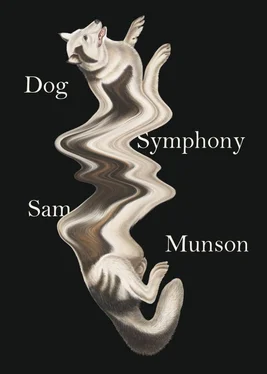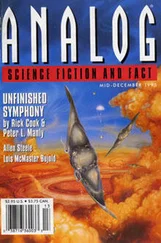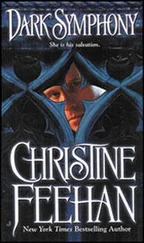Outside the lecture hall, I found a fainter patch of blood shaped like a clover. From that a brief trail extended along the hallway, ending abruptly at the niche where the white marble statue and its white marble mustache awaited me with frightening equanimity. Two students were sitting and reading — one A Universal History of Infamy and the other Hopscotch — on a bench across from the statue; neither had seen the security officers, Alma, the other girl, or Victor, though they claimed, with a collusive snigger, to have been reading for at least an hour, if not longer. I pointed out the blood, viscid and bright. The Borges reader said simply: Fucking disgusting, but it’s not my responsibility. The Cortázar reader didn’t even answer. She let the author’s too-wide-apart eyes, like those of a mantis, stare at me from the back cover.
All writers, the really talented ones at least, have stupid-looking eyes, I thought as I waited for the elevator in the central lobby. The student flow had dwindled to nothing. Only the apocrine scent of youth persisted. And from somewhere, possibly the radio affixed to the janitorial cart, the faint strains of the Dog Symphony. I had to find Ana. I hoped she would be able to explain this disturbance. It could not be the first or last of its kind, I knew, because the chain of student moronism stretches through all times and places. The chants of the women and the fury of the young man — these truly baffled me. The territory they imagined themselves to be contesting, that’s what I hoped Ana could delineate. She would be at the cocktail reception the brochure had gone into surprising detail about, even listing the wines (all from Mendoza) that would be served. She had warned me about this reception in her last letter, saying that it was to be held on the departmental rooftop, in the rooftop garden. She had spoken of this rooftop garden with distaste and spleen, calling it an abode, a hutment, a bivouac, and other such terms. I was, despite my unease and my increasing headache, curious to see the object of her scorn and hopeful that she would at last be present.
Bloody flecks kept appearing on the white elevator floor. I looked directly at them and they vanished, an ocular trick played either by my injury or by my exhaustion. I whistled the same four note phrase over and over: a bar from the Dog Symphony. The elevator doors showed me a twisted, dulled reflection of my face (like an anti-Semitic caricature, with thick lips pursed around a button of void). The doors opened and I stepped forward. I almost injured myself again. The car was stopped short. At my waist, the grooved metal lip of the “floor.” Above it, the cold, silent hallway leading to the offices of the history department. This hallway was floored in puce linoleum, scored with whitish scars. Beneath it, the grimy metal wall of the elevator shaft. A graffito, just under the lip, had been recently painted out. The elevator cab telephone normally used in such situations had been decapitated: frayed copper wires extended from the sawed-open brass tube.
I climbed out. The puce tiling as cold against my palms as the air. I pressed my aching orbit against it as I climbed out. When I had regained my footing I checked to make sure this infantile moment of mine had gone unobserved. Ana’s name was not listed in the directory posted across from the elevators. I didn’t know why this would be the case, and the most fantastic — also the most dull and domestic — justifications spun themselves out. That she had been fired and been too ashamed to tell me. That she had never worked at the University of Buenos Aires at all, that she was merely an academic impostor. That I myself had dreamed her up from the beginning. But she had tenure (she’d written me the day she received it, saying that the water was now up to her eyebrows), which meant she still had her job. As for her existence and academic credentials, I’d read both her books, both published by the University of Buenos Aires Press. Unless those books were hallucinations, Pasternak, I murmured, this is merely an oversight.
The puce reception desk was empty. A puce fan sliced the air above the desk and the puce vinyl-clad chairs for visitors, standing in obscenely sad array on the puce carpet. The air here stank, not of sweat but of disinfectant, powerful esters, the stink of long-rotten bananas. I tried simply shouting: Hello? Only a damp echo met me. The history department, as I walked along its corridors, seemed to be in a state of physical tumult. Like that which precedes a move or follows a suicide. Open cardboard boxes standing outside doors, crammed with books and papers, photographs, eyeglasses, spare shoes, ossified knickknacks. The contents were all more or less identical from box to box. Almost all the doors stood open. Each had the name of its occupant painted on the ribbed, clouded glass panel in the upper half of the door, as if chiropractors were renting the rooms. The offices themselves looked scoured: the windows (transparent) and furniture (puce) stripped of human greasiness and its slavish ironies. Fingerprints, other oily affairs. Blank, broad planks of sheetrock were stacked against walls and in corners, on the upper and lower levels of the six double-decker contractor’s trolleys I counted. The names on the doors obeyed no schema at all. I had to check each one individually to find Ana’s. The department had two identical wings, precise images of each other, extending east and west from the elevator bank. In fact, Pasternak, I thought as I traversed them, they might as well be mirrors reflecting each other, and you might as well be passing from mirror to mirror. An inane thought. I could not rid myself of it. The cold stagnant air seemed itself to conceal a deep snigger. My shoes squeaked abominably. On my second pass, between De Gandia and Zinny , I found Ana’s door: Mariategui , in the black and gold pseudomedical font the historians had chosen to record their own names.
The door itself was closed. A dark, vague shape was visible through the glass — but I could not determine who or what it was, so I knocked. No answer. I tried the handle: locked stiffly in place. I tried again, pressing myself timidly against the wood of the door, as though my added weight might somehow spring the lock. A shuffling, vague murmur came from within the office. I called out: Hello? Ana? It’s me. Are you there? The same nausea that had assailed me as I attempted to work in the Pensión Vermesser assailed me once more now. I kept trying, repeating myself, knocking and jiggling the handle, but the silence within was now absolute. If this is a joke, I said, it’s not funny — Ana, this sort of humor is beneath you, and if it’s not you in there, come out anyway. That final absurdity echoed through the empty hall, but elicited no response. Or only a notional one. I thought I heard a deep chuckle within my friend’s office. Not her own. Her laugh was short, precise, and dry; this was damp and sloppily comprehensive. It didn’t happen again. I pressed my ear against the warming glass and noted the greasy stain my skin left. I heard nothing. Another dream, another fantasy, like the bloodstains on the elevator floor.
This area is off-limits to the public, sir, a rich, calm voice said. A woman in sky-blue livery was striding down the corridor. Her cap could not contain the lustrous mass of her dark hair. Next to her upper lip, a dense-looking, circular mole. I explained that I was not a member of the public, that I was here to look for my colleague, and that I had come at the invitation of the University, of Ana Mariategui and Professor Sanchis Mira. The officer’s silver nameplate read LUXEMBURG. Around her tall, slender throat a silver whistle hung from a leather cord, and attached to this cord was one of the golden, rabbit-shaped labels I’d seen earlier. I’ve never heard of the Pampas hare, I told the officer. It’s a well-known animal, she said, there’s a real infestation of them in certain areas. Whoever found out you could make leather from them is a benefactor to humanity. The chuckling sound came again from Ana’s office. I leaned against the door, pressed my ear to the glass. Nothing more. Dr. Mariategui went home, said Luxemburg. It’s been a tiring time for the people who work here, as you can see. They’re just getting ready to remodel. What is your name, sir? I told her. She did not say: Like the guy who wrote Doctor Zhivago . This is how I was usually greeted when I revealed my name. Instead, she asked for identification. I handed her my driver’s license. She chewed her lip (red, wet-looking) as she peered at it, peered into the digestive pupil of the state. I’m afraid that I can’t accept this. There’s been a municipal ordinance about documentation. Do you have your passport?
Читать дальше












